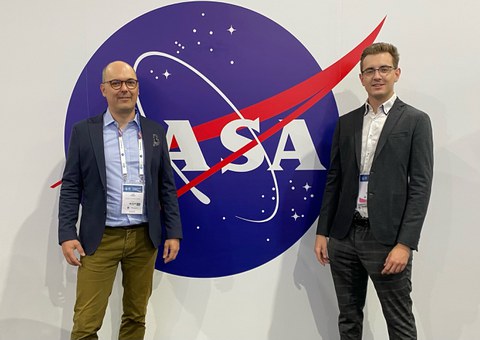Oct 09, 2023
Chair of Finance and Financial Studies presents two working papers at the 74th International Astronautical Congress
Lars Hornuf and Daniel Vrankar traveled to the 74th International Astronautical Congress (IAC) in Baku at the beginning of October. The IAC is the largest annual conference on space exploration and is hosted each year by a different country and its space agency.
Prof. Lars Hornuf presented the working paper "The Public Economics of Space Exploration", which was written in collaboration with Sebastian Fehrler from the University of Bremen and Daniel Vrankar. The authors use the link between the space sector and geopolitics ("space race") to examine the effect of aggressive political rhetoric on approval ratings. To do so, the authors analyzed public opinion on space in nine countries with the highest government space spending in the world. In their study, the authors found only low approval ratings for increasing government space budgets in Western democracies. In contrast, a large majority of respondents in China, India and Russia support an increase in their respective government space budgets. Despite the still prevalent competition between nations in space, citizens are unwilling to spend more money on space when told of the expenditures of countries they classify as their global counterparts. In contrast, citizens are more willing to support an increase in the space budget if they are informed about what their respective home country actually spends on space. This effect is due to the fact that most citizens massively overestimate their nations' space budgets. In addition, citizens in the U.S. in particular want their tax money to go to established government organizations like NASA rather than supporting private companies like SpaceX that can provide services in space much more cheaply. As soon as the paper is available online, it will be linked here, otherwise it can already be obtained from the authors upon request.
Daniel Vrankar presented the working paper "Rocket Science and Innovation Spillovers - Does Space Research Benefit the Economy and Society?". This paper was also written in collaboration with Prof. Lars Hornuf and Prof. Sebastian Fehrler. In the paper, the authors analyze 1.5 million patent applications to understand the extent to which spillovers from space promote industries on Earth. In doing so, the authors find that the 3D printing process in particular, as well as technologies such as batteries and solar cells, benefit from innovations from space. In addition, so-called "New Space" companies (e.g., SpaceX or BlueOrigin) appear to generate more spillover than established aerospace companies (e.g., Boeing or Airbus Defense and Space). As soon as the paper is available online, it will be linked here, otherwise it can already be obtained from the authors upon request.
Lars Hornuf and Daniel Vrankar would like to thank both the visitors of the "IAF SPACE EDUCATION AND OUTREACH SYMPOSIUM - Calling Planet Earth - Space Outreach to the General Public", and the visitors of the "34th IAA SYMPOSIUM ON SPACE AND SOCIETY - Is Space R&D Truly Fostering A Better World For Our Future?" for their helpful comments and suggestions.


